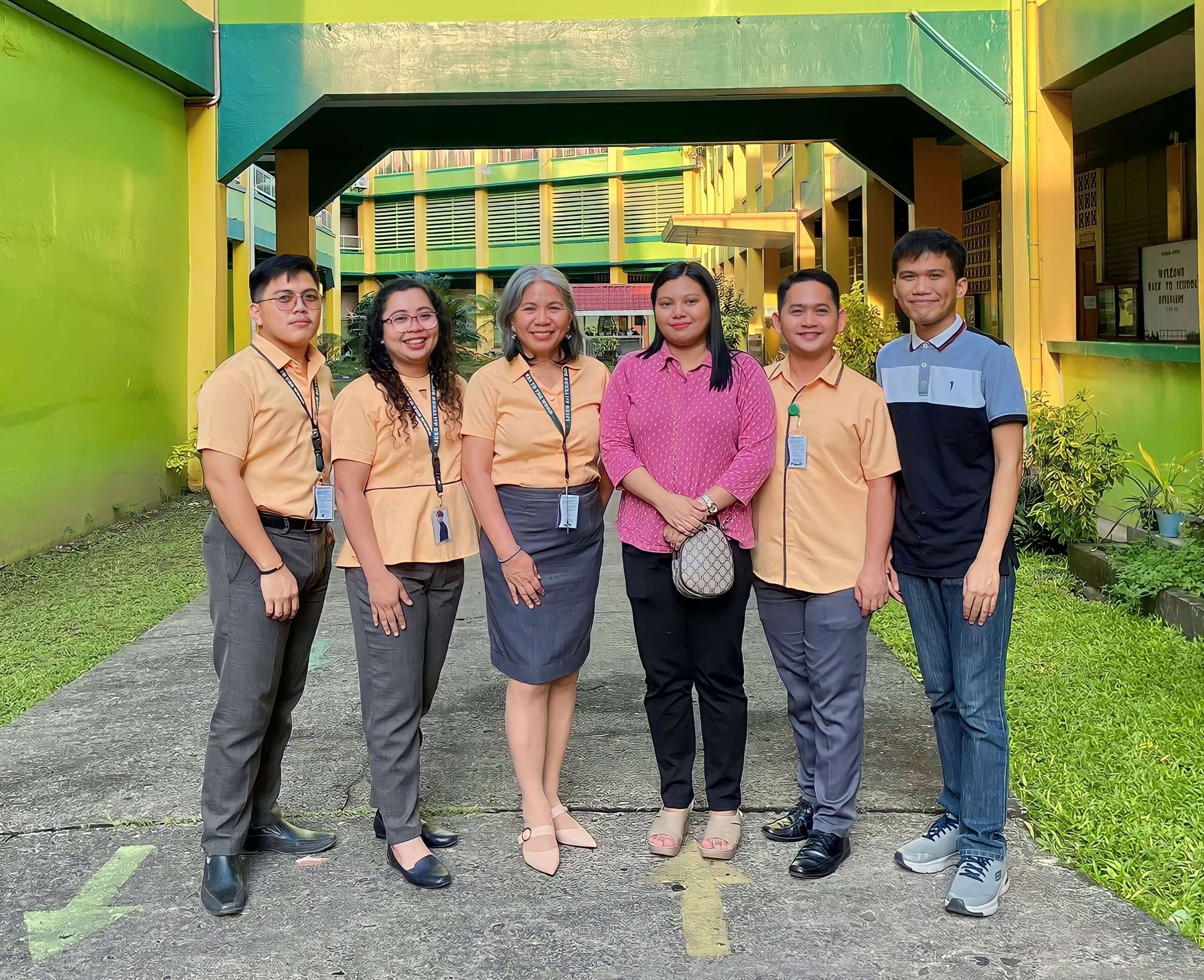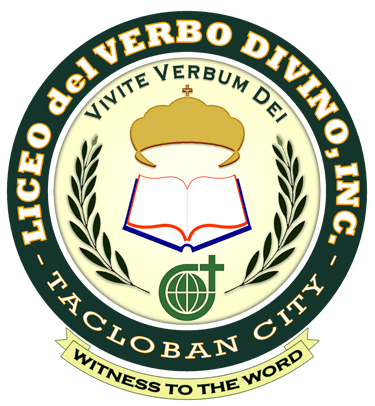International Conference on Educational Measurement and Evaluation (ICEME2023)
Divinians’ in ICEME 2023: Way forward to remediating learning loss
SHANNEN FAITH E. SORIA
Evaluation has been done to people: It is time to do it with, for, and by people. Six papers of the Grade 12 students were accepted for concurrent paper presentation at the International Conference on Educational Measurement and Evaluation (ICEME 2023) on August 24-26, 2023. The Senior High School Department of Liceo del Verbo Divino, Inc. (LVD) submitted some of the research papers of the Grade 12 students that qualify in the theme on the call of papers of the Philippine Educational Measurement and Evaluation Association, Inc. (PEMEA) as it spearheads the said conference. Their research studies were presented by their respective research advisers.
ICEME 2023 aims to engage K to 12 and higher education professional teachers, educational researchers, and other education stakeholders across disciplines and levels in a high-level discussion to evaluate and advance knowledge and skills relating to instructional and assessment strategies. It serves as a platform for intellectual exchange to address current educational issues and concerns on students’ learning and to support educational reforms in the post-pandemic era. This year’s theme, “Learning Loss Assessment and Recovery: Relevance and Directions in Post-Pandemic” and sub-themes encompass topics related to educational assessment and evaluation. Sub-themes include the impact of the pandemic, disruptions on student achievement and growth, the role of assessment in monitoring students’ learning loss, assessment policies, plans and initiatives for learning recovery in both local and international contexts, and effective teaching and assessment strategies for students’ learning recovery.
Within the scope of the theme and sub-themes, the following research studies of the Grade 12 student-researchers were accepted as to their concurrent session : (1) Impact of English-Language Series with Subtitles on the English Proficiency of Grade 12 Students from a Private Learning Institution in Tacloban City by Allunam et al. in Strategies Interventions for Students’ Learning, (2) Screen Time and Sleep Condition Among Grade 12 Students of a Private Educational Institution in Tacloban City by Tingzon et al. in Factors of Academic Performance, (3) Social and emotional learning competency among elementary pupils in a private catholic educational institution in Tacloban City by Avorque et al. in Analysis of Learners’ Competencies, (4) Social and emotional learning competency among elementary pupils in a private catholic educational institution in Tacloban City by Guadayo et al. in Understanding the Learner, (5) Assessing the state of the grade 11 stem students’ retention using digital note-taking in a private catholic educational institution by Gabornes et al. in Assessing Students’ Learning, and (6) Association between active commuting to school and academic performance of grade 7 student commuters in private catholic educational institution by Simborio et al in Factors of Students’ Learning. These papers of the Grade 12 students were presented by their research advisers, namely: Miss Shannen Faith E. Soria, Miss Vanessa C. Collera, Mr. Dean Brando M. Cinco, Mr. Edizon A. Argota, Mr. Francis Kim V. Navarette, and Mr. Ronnie O. Daganasol, respectively.
One of the objectives of the conference is to develop the participants' capacity to demonstrate advanced knowledge and understanding of teaching and assessment strategies by taking into account the policies, plans, and initiatives in addressing learning loss and learning poverty and in accelerating learning gains and learning recovery of various organizations around the globe. There were themes identified for each day of the conference to involve the participants in an open discussion to exchange insights and experiences from different perspectives about diverse areas of measurement and evaluation of students’ learning.
The first day of the conference commenced with the talk of the keynote speakers adhering to the theme: “Impact of Pandemic Disruptions on Student Achievement and Growth.” First to deliver his presentation was Dr. Sungsup Ra, the Deputy Director General Sectors Group of the Asian Development Bank on “Learning Loss is Real: An Analysis of COVID-19 Student Learning Loss (International).” He emphasized the significance of learning loss, methods to measure and evaluate learning, examples of best practices to address learning loss, and the way forward and recommendations concerning learning loss. The COVID-19 school closures in perspective can be described as the pre-pandemic learning crisis compounded with COVID-19 shock resulting in school closures. Subsequently, alternative education delivery was utilized to continue education despite the challenge posed by the pandemic; however, learning loss was evident as one of the outcomes of the transition. School reopening was then initiated to address learning loss complemented with remediation measures. He ended his talk by introducing artificial intelligence or AI as a game-changer for the future of assessment involving teachers automating feedback and learners receiving them in real-time and accurately tracking their own progress.
Hon. Sherwin Gatchalian, a Senator in the Senate of the Philippines, was the other keynote speaker of the day presented the state and directions of Philippine education in the post-pandemic era. He was followed by the plenary speaker, Dr. Anat Ben-Simon, who is the President of the International Association for Educational Assessment shared the admission to higher education and the considerations and challenges in a changing world. Resource speakers for the panel discussion on the first day of the conference were Ms. Kruppskaya (Kay) Anonuevo, the Chief Technical Specialist of EDCOM2 on the topic, “The Impact of Pandemic on Students’ Learning, Dr. Richard Jugar who is Dean of Education of San Carlos University on “National Learning Loss Assessment Results: Philippine assessment for learning loss (PALLS)”, Atty. Nepomuceno Malaluan, Former Undersecretary of DepEd about the role of assessment in post-COVID education, and Mr. Alejandro Ibanez, the SEA-PLM Secretariat of Bangkok for the role of large-scale assessment in learning recovery, and lastly, Dr. Carlo Magno, the Founder of the Center for Learning and Assessment Development for his talk about the “Corresponding Assessment Protocols for learning loss and gaps: What is the difference?”
Day 2 of the conference centered on the theme, “Role of Assessment in Monitoring Students’ Learning Loss” where Dr. David M. Fetterman, the President and CEO of Fetterman and Associates, was the keynote speaker on the topic “Empowerment Evaluation: Capacity Building and Social Justice.” He contended that the use of evaluation concepts, techniques, and findings fosters improvement and self-determination among learners where empowerment evaluation tools anchored to an evaluation approach can increase the probability of achieving program success by mainstreaming evaluation as part of the planning and management of the program/organization and providing program stakeholders with tools for assessing the planning, implementation, and self-evaluation of the program. His talk was wrapped up by stressing that evaluation is done to people where it is now time to do it with, for, and by people. It is supported by the idea of evaluation of the Theory of Process Use in which people conduct it, own it, and act on it. Similarly, the Theory of Action and Theory of Use delineate of minding the gap between espoused ideals and observed behavior.
Meanwhile, the plenary speaker for that day was Dr. Margarete Sachs-Israel, the Chief of Section for Inclusive Quality Education of UNESCO Bangkok, Asia and Pacific Regional Bureau for Education, who presented the assessment and learning recovery post-COVID-19 that covers the regional and international roadmaps and good practices. The impact of COVID-19 on student achievement in Asia-Pacific profoundly disrupted education and learning due to school closures resulting in learning loss and learning gaps. Prolonged school closures deepened pre-existing disparities and low learning outcomes in education. In fact, most vulnerable children suffer the worst outcomes of learning losses; thus, studies correlating the duration of school closure and low learning outcomes were conducted.
The role of assessments is significant in addressing learning gaps as these are used to monitor learning. Large-scale learning assessments (LSA) at the system level can be highly effective in raising awareness and informing policy and be used comparatively to serve benchmarking purposes. It can also be helpful after a learning crisis to measure the impact on learning outcomes but requires baseline data. RAPID is an international learning recovery framework that is an effective assessment to evaluate teaching strategies for learning recovery. The framework stands for ‘Reach’ every child and keep them in school, ‘Assess’ learning levels regularity, ‘Prioritize’ teaching the fundamentals, ‘Increase’ the efficiency of instruction including through catch-up learning, and ‘Develop’ psychosocial health and well-being. She wrapped up her talk by introducing the efforts of the United Nations Educational, Scientific and Cultural Organization or UNESCO that designed programs to support quality learning as it serves as the Secretariat of the Network on Education Quality Monitoring in the Asia-Pacific (NEQMAP). NEQMAP is a platform for the exchange of knowledge, experience, and expertise on the monitoring of educational quality in the Asia-Pacific region. It focuses on student learning assessment as a key tool for monitoring education quality, while, at the same time, acknowledging the importance of developing strong linkages with other enablers of learning in classrooms including curriculum and pedagogy.
Moreover, the resource speakers for the panel discussion were Dr. Roger Yap Chao Jr., the Assistant Director/Head of Education, Youth and Sports, and the ASEAN Secretariat for his talk, “Reopen, recover, and resilience in education: Guidelines for ASEAN countries”, Mr. Nicholas Tenazas, Education Specialist of UNICEF-Philippines with the topic, “UN Initiatives in transforming Philippine Education”, Dr. Bernardo Sepeda, the Executive Director of National Research Council of the Philippines for the “Research Roadmap for Science and Technology Post COVID-19, and Dr. Marilyn Balagtas, the Dean of Graduate Studies and Teacher Education Research at Philippine Normal University on her presentation about the “K-12 Assessment Policies and Their Responsiveness to SDG.”
On the last day of the conference, the theme centered on effective teaching and assessment strategies for students’ learning recovery with Dr. Ina Mullis, the Executive Director of TIMSS & PIRLS International Study Center as the keynote speaker. She highlighted the international achievement in Mathematics and Science of more than 330,000 students in the fourth grade among 58 countries. Trends in International Mathematics and Science Study (TIMSS) contexts for teaching and learning indicated the achievement as to gender differences of fourth graders at TIMSS International Benchmarks in both Mathematics and Science. Factors such as the role of homes in supporting students in learning with their accessible resources for learning play a crucial role in student achievement. Homes should be complementary to schools' instructional climate that puts emphasis on academic success within a safe and orderly environment.
She also projected a comparative analysis of the international Mathematics and Science curriculum with the Philippines in terms of instructional time spent. There is a total of 895 instructional time hours per year internationally spending 154 hours in Math and 73 hours in Science; meanwhile, the Philippines has a slight uptick for a total of 1 225 hours with 173 hours for Math and 158 for Science. TIMSS Mathematics content areas include 50% for number mastery such as whole numbers, pre-algebra, fractions and decimals, 30% for measurement and geometry, and 10% for fractions and decimals. Moreover, the Science content areas are 45% in life science – characteristics of living things, 35% in physical science – properties of matter, energy, forces, and 20% in earth science – characteristics of earth, solar system. These topics are aligned to TIMSS cognitive domains: Mathematics and Science where knowledge is 40%, applying is another 40%, and reasoning for 20%. Additional instructional factors they identified are absenteeism, instructional clarity, disorderly behavior, technology instruction, and attitudes of the students toward mathematics and science lessons.
Further, the resource speakers for the panel discussion were Dr. Miguel Rapatam of De La Salle University with his topic on “Learning Recovery Actions of Private Secondary Education Schools”, Dr. Richard Gonzales, the Chief Executive Advisor/Lead Human and Social Development Specialist at Inno-Change International Consultants, Inc. who discussed on “How will TVET Curriculum Implementation and Evaluation Transform, Advance, and Innovate in the Post-Pandemic Era? Reflections for the Philippines”, and Dr. Gilbert Sadsad, the Director of the Department of Education Region V, showcased their region’s best practices during the pandemic in his presentation, “DepEd Region 5 Initiatives on the Implementation of the Learning Recovery Plan.” The conference concluded with the awarding of a plaque of appreciation to the organization’s board of trustees and oath-taking of its new set of officers.
Teacher-presenters received their certificates of recognition after they presented their papers in their respective concurrent sessions. Some of them have shared their takeaways from participating in the three-day research conference. Miss Shannen Faith, one of the presenters, recognizes the impact of the discussions among researchers during the conference as it underscored the urgency of tailored recovery approaches that consider diverse student needs and experiences to mitigate the lasting effects of disrupted learning. “As an educator, attending the ICEME 2023 was such an enlightening experience for me because I was able to witness other educators all over the Philippines share their research explorations on different learning strategies and interventions. Also, the thought of being one of the paper presenters was a fulfilling one because I was able to represent LVD, most especially my research advisees,” she stressed.
Sir Edizon, who is also one of the presenters, pointed up how his participation in the said conference inspired him to think bigger and aim for more ambitious research goals. Engaging with his fellow researchers, including experts in his field, has opened doors for potential collaborations and knowledge sharing. “I improved my ability to communicate complex ideas succinctly through elevator pitches and poster presentations, which will benefit me in both research and professional contexts,” he added. Indeed, the conference is true to its objectives of providing an avenue for researchers to show high substantial degree of independence in critically discussing and evaluating learning loss, and reflecting on evidence-based strategies to accelerate student learning recovery and turn what is lost into gains.





